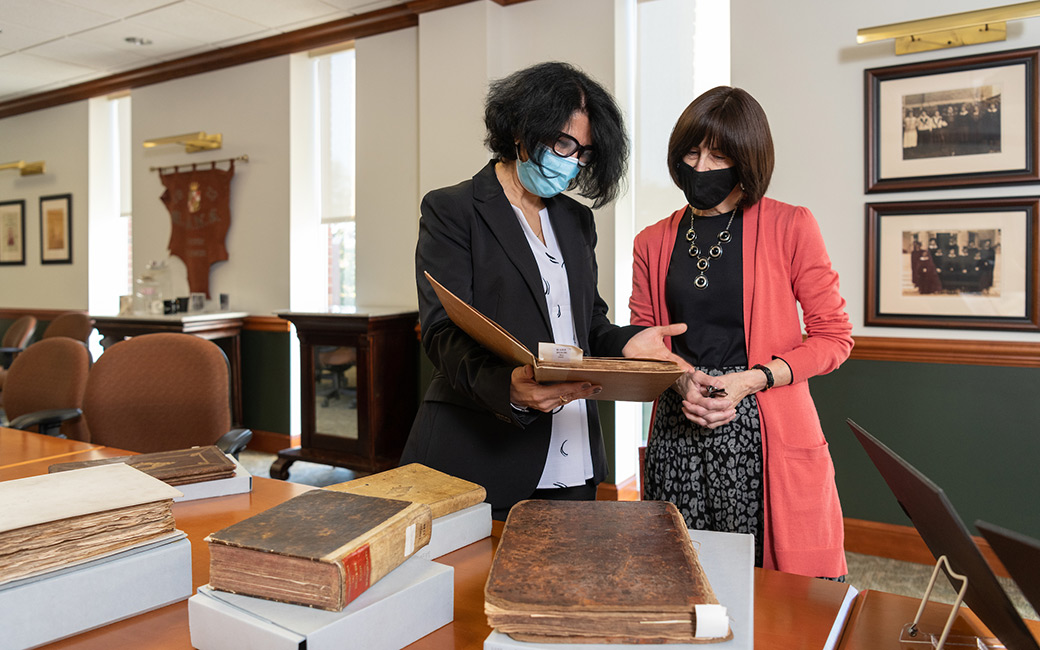Visiting professor resurrects ‘female philosophers of the past’
Baltimore Hebrew Institute hosted Bar Ilan University philosophy professor Ronny Miron
By Rebecca Kirkman on December 7, 2021

The Baltimore Hebrew Institute (BHI) at Towson University recently hosted Ronny Miron, a visiting professor of philosophy from Bar Ilan University in Israel and an expert in phenomenology, for a series of engagements with students and the broader community on campus.
An expert in phenomenology, a branch of philosophy focused on the structures of experience and consciousness, Miron’s visit to TU offered a chance to discuss her work with students and colleagues who bring a different perspective to the study of Jewish history and philosophy than her colleagues in Israel.
For TU students, her presence offered a distinct approach to and perspective of philosophy and Jewish studies. For faculty, staff and the community, it was an opportunity to hear from a leading voice in phenomenology, an exploration of how individuals’ interactions or lack of interactions with objects and experiences shape how those objects and experiences are defined.
Such cross-cultural knowledge exchange is part of BHI’s committment to support graduate students pursuing degrees in Judaic Studies as well as community enrichment through a wide range of programming, lectures and events related to Jewish topics.
In her Nov. 8 lecture, “Presence, Change & Continuity in History: The Cast Study of Modern Historiography,” Miron drew on her 2014 book “The Angel of Jewish History: The Image of the Jewish Past in the Twentieth Century” to address the impact of secularization on history and culture. She also engaged with graduate students while guest teaching philosophy and religious studies assistant professor Gilad Sharvit’s course JDST 650: Special Topics in Judaic Studies on the topic of Zionism and its critics.
“I was happy for this opportunity to talk to Dr. Sharvit’s students and to share with them my studies, because obviously it's different to talk about Jewish studies here than in my country, where it is a more known and established field of research,” Miron says. “It’s very interesting for me to see what attracts students here to Jewish philosophy.”
She also visited the University Archives and Special Collections at Albert S. Cook Library for a white-glove session with librarian Elaine Mael, featuring works in Miron’s research areas from the Baltimore Hebrew Institute Special Collections.
Miron is internationally known for her work bringing to light a forgotten group of women philosophers in Germany who studied phenomenology in the early- to mid-20th century. In her most recent book, “Hedwig Conrad-Martius: The Phenomenological Gateway to Reality,” she resurrects the work of Conrad-Martius, the “first lady of German phenomenology” and part of the Munich–Göttingen Circle of phenomenology scholars.
“They took phenomenology beyond the boundaries that were drawn by the founding father Edmund Husserl, and this required daring, insistence and readiness to pay the price that comes with violating the great authorities of the field,” Miron says. Despite the ground-breaking nature of their work, when Miron began her research, the women remained unknown even by experts in the field of German phenomenology. But thanks to Miron, that has changed. “In the last five years, you can begin to find them in the syllabus of university courses,” she adds.
Sharvit, who invited Miron to visit Towson University after she spoke at an event he organized, says she is responsible for highlighting not only the forgotten female philosophers but also a different approach to studying philosophy.
“She’s helping resurrect voices of women philosophers of the past,” says Sharvit. “She’s able to give us the tools to present more voices in the classroom, which is very important.”
Her research into the women in the Munich–Göttingen Circle also reveals a different approach to philosophy, traditionally a solitary pursuit. “Philosophy is something that is a very individual and alone project, you’re doing it with your books, you’re doing it with reading materials, you’re writing in your room; it’s really a very lonely occupation,” Sharvit explains. “And what she’s offering in a way, by going back to the past, is thinking differently about what it means to do philosophy, like something as a group project.”
Sharvit, who plans to visit Miron’s students at Bar Ilan University, hopes to continue the cross-cultural exchange with assistance from the Study Abroad Office. “We’re really interested in continuing this exact kind of exchange,” he says. “This visit only proves the importance of exchange of ideas and ideals in the current intellectual environment.”